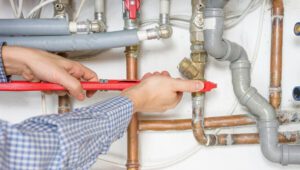What to Look for in a Plumber
Whether you need a plumber for a leaking faucet or a drain, Plumber can provide you with the right service. A plumber is skilled in installing sewage, drainage, and potable water systems. In this article, we’ll discuss the different types of plumbing services available and what to look for in a qualified plumber. Here are some of the most common services provided by plumbers. These services will be vital to the daily operation of your home or business.

A plumber’s job requires the individual to assess the underlying problem and offer an appropriate solution. This profession requires considerable physicality and is often a dirty job. As a result, many plumbing apprentices are often dropped after several months of employment. However, the benefits of working as a plumber far outweigh the downsides. Moreover, many plumbers make significantly more money than the average person. But be sure to do your research before you start working as a plumber, as the job isn’t for everyone.
Become a licensed plumber. Most jurisdictions require plumbers to have a license in order to work independently. This license usually requires two to five years of experience, and you can find extensive information about state licensing requirements on the website. As an employee, you’ll be happier if your work is flexible and stress-free. If you’re looking for a rewarding career that allows you to work when you want to, a plumber’s job is a great choice.
A plumber can also be referred to as a pipefitter. This is a trade that requires the fitting of pipes, including water, gas, and sewage pipes. Conduit material for these pipes varies and can include lead, iron, copper, glass, and plastic. A pipefitter may also be referred to as a plumber if he or she works with lead. As an apprentice, a pipefitter must undergo extensive training to learn technical skills.
As a licensed plumber, a licensed plumbing contractor can be certified by the state, which demonstrates their expertise and professionalism. If you’re licensed by the state, you can work in a variety of areas. Some plumbers specialize in the installation of potable water, sewage systems, and drainage systems, such as sewers and storm drains. A plumber can also install sinks and toilets, unclog drains, and repair septic systems.
To be a successful plumber, you must be self-motivated, a good problem solver, and enjoy dealing with people. You may work in residential or commercial buildings. You may even work in a park or farm. Experienced plumbers may own their own business and hire entry-level plumbers for their team. Most plumbing jobs do not require formal education, although some companies prefer candidates with higher education. However, a basic knowledge of mathematics and science may help you land a job as a plumber.
When selecting a plumber, you can use the recommendations of a friend or family member. You can also price shop a plumber before choosing one for your plumbing needs. Make sure to give as much information as possible about the job you need to be done. Ideally, you should also have a preferred plumber in mind before contacting a plumber. This way, you will be able to get an accurate estimate from multiple plumbers. You can also be assured of getting a good plumber for the best price and quality service.
There are two main types of plumbing jobs: apprentice plumber and journeyperson plumber. Apprentice plumbers are paid to learn the trade. As they learn, they are supervised by more experienced plumbers. Apprentice plumbers may perform installation work under the direct supervision of an experienced technician. Plumbers can also choose to specialize in certain areas of plumbing. Usually, they are paid a little higher than journeymen plumbers, but they are also more capable of handling more complicated tasks.
Depending on the complexity of the job, plumbers charge between $45 and $200 per hour. A plumber is licensed for basic home repairs, but they will need to be supervised by a master plumber to complete complex tasks. A plumber is often the best choice for most basic tasks, such as unclogging a sink. The average plumber’s fee for unclogging a drain ranges between $100 and $400. Plumbers charge more if they work on the weekends or on holidays.
Backflow isn’t a fun plumbing problem. This is when the water from the faucet doesn’t drain properly, leaving a watery mess behind. If your plumber can unclog the drain and prevent this from happening, the plumbing problem won’t be so difficult to solve. If the water pressure in the shower is too low, it can prevent shampoo from properly rinsing your hair. Low water pressure may be the result of a malfunctioning faucet aerator. Your plumber can help you find a simple fix or determine if you have a larger problem.
